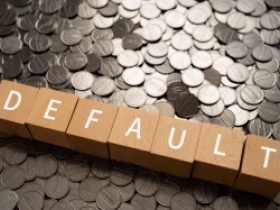What to Expect When a Bond Defaults

May 13, 2024
When investing in bonds, it is important to understand all the details of the structure of this financial instrument, including what happens in the event of a default. While the thought of a bond defaulting can be very concerning, it is essential to approach the situation with optimism and a clear understanding of the potential outcomes.
But what does a bond default mean? A bond default occurs when the issuer fails to make interest payments or repay the principal amount as agreed upon in the bond contract. This may happen for a variety of reasons including financial difficulties or external economic factors. Bondholders should however be aware that a default does not necessarily mean that they will lose all of their investment.
In some cases, the issuer may be able to restructure its debt or negotiate a new payment plan with bondholders. This can involve extending the maturity of the bond, adjusting the interest rate, or even exchanging the bond for equity in the company. Some bonds are also secured by assets which can be liquidated by the issuer to meet its obligation to bondholders.
Investors should also know that bond defaults are relatively rare occurrences, especially for investment-grade bonds. Most bonds are repaid in full and on time, providing a steady stream of income for investors while they hold the bond, and repay principal at maturity. In the unlikely event of a default, bondholders are typically able to recover at least a portion of their investment through a bond restructuring.
Ultimately, the key to navigating a bond default is to stay informed, remain patient, and maintain a positive outlook. By staying informed and closely monitoring developments in the situation, investors can position themselves to make informed decisions and potentially minimize any losses. Your financial advisor will be able to provide the relevant information and guidance to ensure the best outcome for you.
While a bond default can be a challenging situation to navigate, it is important to approach the process with optimism and a clear understanding of the potential outcomes. By staying informed and remaining patient, bondholders can work towards a positive resolution and potentially recover some or all their investment. Remember, bonds are typically a reliable investment option, and defaults are the exception rather than the norm.
Dwayne Neil, MBA, is the AVP, Personal Financial Planning at Sterling Asset Management. Sterling provides financial advice and instruments in U.S. dollars and other hard currencies to the corporate, individual and institutional investor. Visit our website at www.sterling.com.jm Feedback: if you wish to have Sterling address your investment questions in upcoming articles, e-mail us at info@sterlingasset.net.jm.
